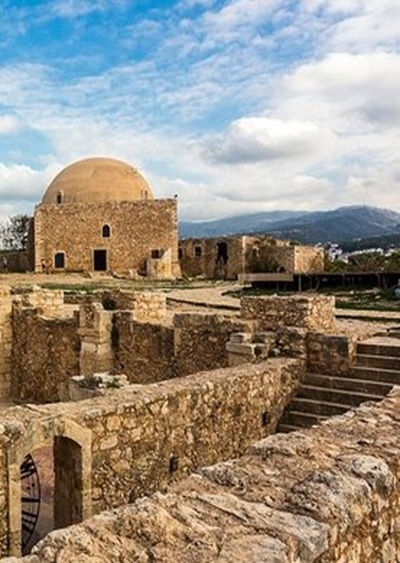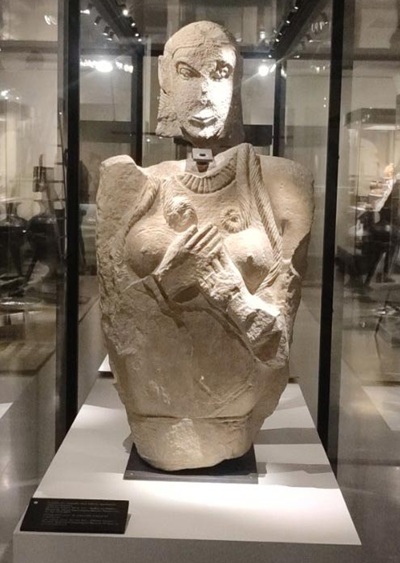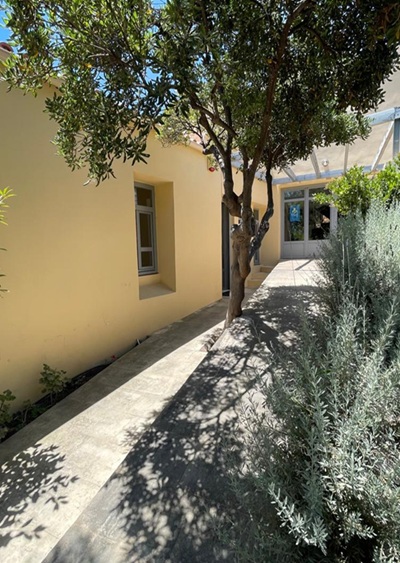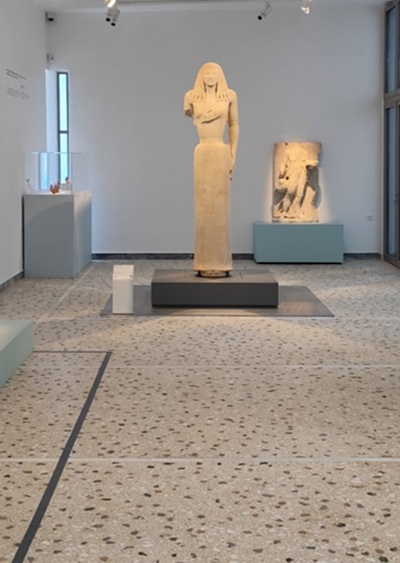
State Literary Awards 2021
The Ministry of Culture and Sports announces the 2021 State Literary Awards (for the 2020 editions), the 2021 State Literary Translation Awards (2020 editions) and the 2021 State Children’s Book Awards (2020 editions).
Specifically, the 2021 Grand Prize for Literature, the 2021 State Literature Prizes (Novel, Short Story-Novel, and Poetry Prizes), the 2021 State Essay-Testimony Prizes (Essay-Criticism and Testimony-Biography-Chronicle-Travel Literature Prizes) are announced today, the Emerging Author Award 2021, the Special Thematic Award 2021 (for a book that significantly promotes dialogue on sensitive social issues), and the awarding of an honorary distinction to journals.
The awards are as follows:
Α. The Grand Prize for Writing for the year 2021 is awarded to Dimitris Tziovas for his overall contribution to Letters.
Β. The State Novel Prize 2021 is awarded by a majority of half to Nikos Davvetas for his work Men without Men, Patakis Publications, and to Louisa Papaloizou for her work The Mountain, To Rodakios Publications.
C. The State Prize for Short Story – Novel 2021 is awarded by a majority of half to Thanasis Hatzopoulos for his work Historical presente, Polis publications, and to Christos Christidis for his work Naked, Entefktiriou publications.
D. The State Poetry Prize 2021 is awarded by a majority to Dionysis Kapsalis for his work Notes on the Music of the World, Agra Publications.
Ε. The State Prize for Essay – Criticism 2021 is awarded by a majority to Christina Koulouri for her work Fustanelles and Chlamydes. Historical memory and national identity 1821-1930, Alexandria Publications.
F. The State Prize for Testimony – Biography – Chronicle – Travel Literature 2021 is awarded by a majority to Stratos N. Dordana and Vaios Kalogrias for their work The Lives of Others, The Stasi and the Greek political refugees in East Germany (1949-1989), Epikentro Publications.
G. The State Prize for Emerging Writer 2021 is awarded by a majority of half the prize to Spyros Goulas for his work TLast year’s clothes instead of new ones, Polis Publications, and to Phoebus Economidis for his work Vorras, Bookstore of Estias Publications.
H. The Special State Prize 2021 for a book that significantly promotes the dialogue on sensitive social issues, is awarded by a majority of half of the award to Panagiotis Hadjimoysiadis for his work Hospitalization expenses, Enypnio publications, and to Dimitris Christopoulos for his work Jindili, To Rodakios publications.
I. The Committee unanimously decided to award an honorary distinction to the journals de|kata and Semitations.
State Literary Translation Awards 2021
The Committee responsible for the 2021 State Literary Translation Awards has decided on the awards for the categories Prize for the Translation of a Work of Foreign Literature into Greek, Prize for the Translation of a Work of Ancient Greek Literature into Modern Greek and Prize for the Translation of a Work of Greek Literature into a Foreign Language.
The following are the 2021 State Literary Translation Prizes by category:
A) The State Prize for Translation of a Work of Foreign Literature into Greek 2021 is unanimously awarded to Euripides Garantoudis, for his translation of Sandro Penna’s work, The Poems, Gutenberg Publications, Athens.
B) The State Prize for the Translation of Ancient Greek Literature into Modern Greek 2021 is unanimously awarded to Thanasis Valtinos, for his translation of Euripides’ Troades. Medea, published by Hestia Bookshop, Athens.
C) The State Prize for the Translation of a Work in Greek into a Foreign Language 2021 is unanimously awarded to Nicola Crocetti for the translation of the work of Nikos Kazantzakis, Odissea, Crocettieditore Publications, Milan.
State Children’s Book Awards 2021
The Committee decided on the awards in the categories of Children’s Literary Book, Teenage – Young Adult Literary Book, Children’s Illustrated Book and Children’s Knowledge Book.
Children’s Literary Book Award
Michael Makropoulos, illustrated by Katerina Hadoulou: The soft oak tree, Kaleidoscope Publications
Teenage/Young Adult Literary Book Award
Eleni Priovolou: Light in a Black Sky, Kastaniotis Publications
Illustrated Children’s Book Award
Iris Samartzi, illustrated by Iris Samartzi: Tata;;, Icarus Publications
Knowledge Book Award for Children
Stella Kasdagli, illustrated by Fotini Tikkou: 30 women who changed the world and how you can change it too, Pataki Publications
……….
REPORT OF THE STATE ACCOUNTING TRANSLATION AWARDS COMMITTEE 2021 (2020 editions)
AWARD RATIONALE
The State Literary Translation Awards Committee 2021 (2020 editions) announces the rationale for awarding the winning books, by category:
A) The State Prize for the Translation of Foreign Literature into Greek 2021 is unanimously awarded to Mr Euripides Garantoudis, for the translation of Sandro Pennas’ work, The Poems, Gutenberg Publications, Athens.
For his excellent, literarily exemplary, scientifically correct and functionally effective translation of Sandro Penna’s Answers, a peculiar atmospheric poet, with a cinematic setting and subtle, if subtle, erotic connotations in a variety of shades.
B) The State Prize for the Translation of Ancient Greek Literature into Modern Greek 2021 is unanimously awarded to Mr Thanasis Valtinos, for his translation of Euripides’ Troades-Mideia, published by Vivliopoleion of Estia, Athens.
This translation of two emblematic and particularly demanding works has been done with great poetic sensitivity and awareness of the dramatic tensions that pervade them, while the renderings are distinguished by a calibre and sense of rhythm that make their content accessible to the young reader.
C) The State Prize for the Translation of a Work in Greek into a Foreign Language 2021 is unanimously awarded to Mr Nicola Crocetti for his translation of Nikos Kazantzakis’ work Odissea, published by Crocettieditore, Milan.
In 2020, the renowned Hellenist and translator Nicola Crocetti left an indelible mark on the translation and cultural scene with the monumental publication in Italian of the Odyssey, Nikos Kazantzakis’ gigantic and provocative epic in Italian (Nikos Kazantzakis, Odissea, Crocetti editore
COMMITTEE FOR THE STATE LITERARY PRIZES
STATE PRIZES 2021 FOR THE PUBLISHING YEAR 2020
AWARD SCHEME
At its meeting on March 3, 2022, the 2021 State Literary Awards Committee for the year 2020, reached the following decisions:
The Grand Prize for Literature is awarded to Dimitris Tziova for the overall contribution of his work to literature.
The Committee considers that Dimitris Tziovas, with his original, reflective and uninterrupted contribution to Greek letters, contributes to the renewal of modern Greek studies, enriching critical literature with new methods and interpretative readings. At the same time, through his work he has made a decisive contribution to the promotion and dissemination of Greek letters abroad. By following with a bold revisionist attitude the successive turns in literary theory (from narratology and structuralism to new historicism and moral criticism), the author introduced and familiarized the Greek public with international trends and developments in the study of literature, pointing out broader cultural, social and reading changes. His rich work, particularly influential to scholars of cultural and modern Greek studies as well as social and political sciences, links literature with culture and society, with political and cultural contexts, contributing to the defence of the broader humanities and to the serious study of issues of ideology and identity in modern Hellenism.
For all of the above, he is awarded the Grand Prize of Letters.
***
The Novel Prize is awarded by a majority of half to the books by Nikos Davvetas, Andres ohne mantres (Patakis publications) and Louisa Papaloizou, To vouni (To Rodakio publications).
Davvetas’ novel has as its central theme the “slaughterhouse” of the family, placing the father-son relationship in a psychoanalytical and historical subsoil. It is a work of exceptional narrative economy and swift storytelling that captivates the reader, with a strong plot, twists and turns and convincing characters, while its precise use of historical material captures in detail the “structure of feeling” and the atmosphere of the post-war and post-dictatorship era. His thematic revelations are also rich: memory, erotic desire, emotions, family trauma, violence, the body and history.
The Prize in the Short Story-Novel category is awarded by a majority of half of the winners to Thanasis Hatzopoulos for his book Historikos Enesto (Polis Publishers) and to Christos Christidis for his book Gymnos (Entemptaktiriou Publishers).
Time in Thanasis Hatzopoulos’ stories seems to happen, but not to have happened. It exists to remind us of what has happened and brought us here, what is about to happen, what is about to happen again. His stories are reminiscent of tales plucked from a police bulletin, from the history of the place, from the “Socials” of the newspapers and the funeral papers of memory. The Historian in the present is a hybrid jumble of “oblique” stories that highlight what is lost in time, those trivialities that determined the course of the lives of heroes and heroines, the forgotten events that marked our common destiny, “the events that mobilize the inert matter of life”. Thanasis Hatzopoulos, a persistent scribe, with an already remarkable career in Greek Letters, does not retreat in the face of this inertia; he feeds the rupture, even if it leads to death, to the eternal, inevitable, but quasi-consoling sleep.
Christos Christidis’ novel deals with the condition of death, or the path to dying and the final resting place, in an original way, opting for a dystopian approach. The heroes are a man accompanying an elderly man in a wheelchair, who, after the obligatory landing of the ship they were on, are forced to disembark in a city they do not (re)know. Some things seem, however, very familiar. The older man’s memories begin to resonate with the present. The two men meet various interesting faces that implicitly warn them that they have come to a necropolis from which they cannot (re)leave. Christides’s writing, however, is distinguished by graceful ease, sparkling dialogues full of humour, while the immersion in the depths of existence spills out onto the narrative surface as an accreditation of identities in flatulence.
***
The State Poetry Prize 2021 (2020 editions) is awarded by a majority to Dionysis Kapsalis for his collection Notes on the Music of the World (ed. Agra), in which the poet, as noted, with a calm contemplation on time, beauty, pain, moments of immortality, affirms his clear personal voice, a voice that is settled and in this case conversational, rightly conversing with a broad intertextual context. Dionysis Kapsalis looks at loneliness and death from the back of the hill.
Maria Laina’s collection What Happened was also discussed and put to a vote. People and Ghosts (Pataki ed.), since, as noted, Laina, in a peculiar account of life and existence, has composed a collection of short poems, where the subtlety of feelings and sensations is expressed in verses of instant functionality
***
The Essay – Criticism Prize is awarded by a majority to Christina Koulouri for her work Fustanelles and Chlamydes. Historical memory and national identity 1821-1930 (Alexandria Publications).
It studies the perception of the 1821 Revolution in historical memory and its influence on the formation of national identity from 1821 to 1930. The author consults two broad categories of ‘non-textual’ sources; one includes representations of the Revolution, oil paintings, lithographs, woodcuts, photographs, but also statues, heroes and monuments to the fallen. Also discussed and included in the final vote was the study by Effie Gazi, Unknown Country. Greece and the West in the early 20th century (Polis Publications).
The author attempts to map an “unknown country” with scientific completeness, using as a compass the dominant perceptions of what “Greece” and “Greeks” were at the end of the 19th and the beginning of the 20th century. This mapping is carried out through the work and thought of three iconic figures of this period: the great Argyris Efthaliotis, Pericles Giannopoulos and Ion Dragoumis.
***
The majority of the Prize for Testimony, Chronicle, Biography and Travel Literature is awarded to Stratos N. Dordana and Vaios Kalogrias for their book The Lives of Others: the Stasi and Greek Political Refugees in East Germany (1949-1989) (Epikentro Publications). This is an in-depth investigation into a hitherto unilluminated period of the 1940s. The authors have researched a large number of archives and highlighted with sobriety and competence the presence and role of Greek political refugees in East Germany as well as the participation of some of them in the Stasi secret services.
Vana Boucher’s book, Everyday Life in Otto’s Greece (published by Bookstore of Estia) was also discussed to provide new interpretive approaches through thorough research into everyday life in the 19th century
***
The State Prize for Emerging Writer 2021 up to 35 years old is awarded by a majority of half of the winners to Phoebus Economidis (b. 1997) for the novel Vorras (published by Bookstore of Estia) and to Spyros Goulas (b. 1991) for the poetry collectionThey put them for good (published by Polis).
Phoebus Economides, who flirts with the literature of fantasy, speaks with a psychographic mood about the fluid and fragmented ethos of the time, with the story being built around the expected collision of the earth with a planet. He writes sensitively about the existential wanderings and pursuits of happiness of his generation, under the guise of a futuristic dystopia.
***
The Special Prize for authors whose books promote dialogue on sensitive social issues is awarded by a majority of half to Panagiotis Hadjimomysiadis for his work Exodus nosegalia (Enypnio publications) and to Dimitris Christopoulos for his work Jindily (To Rodakio publications).
Hadjimoysiadis’ novel with its healing writing, deep humanism and sense of moral responsibility deals with the relationship between nurse and patient. The confessional monologues about loneliness, illness, death, decay and trauma palpate public and private passions with touching immediacy, as the novel, by indirectly conversing with the condition of the pandemic crisis, extends the gaze to social morbidity. Illness is presented as a reflective occasion for the discovery of self and truth, as a confrontation with the past, fears and hopes.
***
Finally, an honorary distinction is unanimously awarded to the literary journals Decas and Notes for their contribution to the dissemination, promotion and discussion of literature and letters.
REPORT OF THE STATE CHILDREN’S BOOK AWARDS COMMITTEE 2021 (2020 editions)
AWARD RATIONALE
The State Children’s Book Awards Committee 2021 (2020 editions) announces the rationale for awarding the winning books in each category:
Children’s Literary Book
The State Prize for Children’s Literary Book is awarded by a majority to the book by Michalis Makropoulos entitled The Soft Oak (Illustration by Katerina Hadoulou), Kaleidoscope Publications.
With the fiction utilizing modern Greek fairy tale motifs, elements of our folk tradition and unadulterated images of Greek nature, as well as the synergy of the unique illustration that literally embraces the text, the book unfolds dreamily, almost magically, the passage from childhood to youth of a ten-year-old heroine, Athena. Guided by an acorn that lies tucked into the pocket of a girl’s dress and emits light, the protagonist, like another Alice in Wonderland, flees into the woods one evening. There, overcoming obstacles with the help of the trees and animals she encounters, she experiences all the processes of her maturation, awakens spiritually and erotically, becomes liberated and acquires her own ‘acorn of light’ to continue her quest more strongly.
The particular characteristics of the book, which refer to the defining elements of an ‘evolutionary narrative’, successfully meet the criteria generally set for books in this category: sincere authorial intentions, original but comprehensible themes, beautiful images and convincing descriptions, an interesting plot and flowing writing. Between realistic intentions and imaginative narrative modes, the book constitutes a symbolic coming-of-age story, revisiting and activating older motifs in an updated fictional frame of reference.
In the same category, Aleka Tripou-Manou’s book entitled Soufflé Chocolat, published by Metaixmio, stood out, but received a minority vote.
With the thematic element of divorce dominating its setting, the book touches on topical issues such as domestic violence and abuse. The first-person narration of ten-year-old Sophia, reminiscent of a diary entry, convincingly captures the perspective of the central heroine and the problematic reality she has to deal with.
Teenage-Juvenile Literary Book
The majority of the State Prize for Adolescent-Youth Literary Book is awarded to Eleni Priovolou’s book Light in a Black Sky, published by Kastaniotis.
It is a social novel with a fast plot and a realistic character, which through the sequence of events presents issues such as unemployment, racism, immigration, domestic violence, emblematic historical events, terrorist events, fascist gangs, etc. The first-person narrative realistically portrays the experiences of the teenage protagonist, avoiding any trace of melodrama. In the same category, the book by Giorgos Hatzopoulos, entitled Gather your courage, Ando, Pataki Publications, stood out, but received a minority vote.
Illustrated Children’s Book
The State Prize for Illustrated Children’s Book is awarded by majority vote to the book by the author and illustrator, Irida Samartzi, entitled Tata;;, Ikaros Publications.
The heroine creates, centred on her home, a fantasy world for her and her friend Tata. She continuously fills it with things she wants (with a playground, a garden, a tree house, a swimming pool, rooms for her beloved animals, a library). As the imagination and desires grow, the illustrations take up more and more of the living room, until the imaginary world becomes huge, so much so that it doesn’t fit on a two-page spread, but spreads out into a four-page spread. But Tata is gradually pushed beyond it.
In the same category, the book by Theodore Papaioannou, illustrated by Petros Bouloubasis, entitled When you are away…, Patakis Publications, stood out, but was voted down.
Knowledge Book for children
The majority of the State Book of Knowledge Award for Children is awarded to the book by Stella Kasdagli entitled 30 women who changed the world and how you can change it too (illustrated by Fotini Tikkou), Pataki Publications.
The book belongs to a special category of knowledge book, that of biographies and specifically collective biographies, since, as the title anticipates, it concerns the biography of 30 women (including one Greek woman). The first and last parts contain the portraits of each woman and a very brief biographical summary, i.e. the nature of her contribution to the human community and the main motto attributed to her. But what makes the book unique and original are the intermediate pages (from pp. 18 to 244) where the biography of each woman is presented through a first-person narrative narrated by the biographer herself.
In the same category, Mariza Decastro’s book entitled 24 Images of the 1821 Revolution, Makrygiannis & Painter – A fighter and an artist, Capon Publications, stood out, but received a minority vote.







Leave A Comment